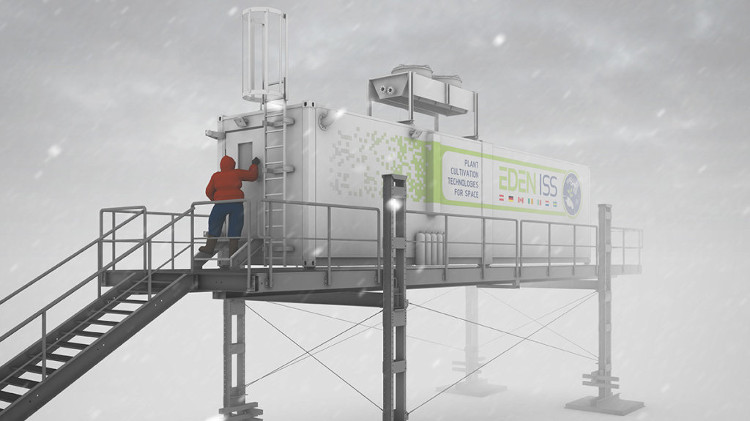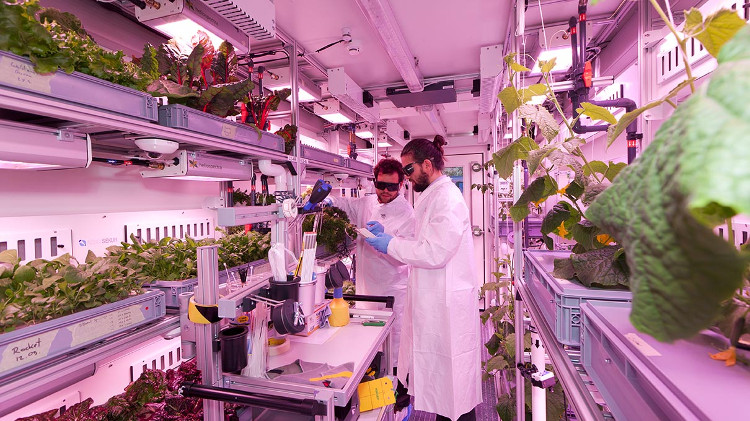Container farm tested in Antarctica before boarding ... Mars
Antarctica is a non-cultivation area. But starting in January 2018, researchers at Neumayer III (Germany) will start planting tomatoes, lettuce, herbs, peppers, cucumbers, radishes, even strawberries inside containers. insulation here.
Although there are already many indoor gardens in Antarctica, the Neumayer III Institute's EDEN ISS Mobile Test Facility will be the most advanced indoor farm on the continent. This is an experiment that goes beyond the confines of home agriculture, maybe even to ... Mars.
On the huge iceberg of the Ekström Ice Shelf in the middle of the Atlantic Ocean, the greenhouse farm will survive under the cold, dark and humid conditions of Antarctica.

EDEN ISS Mobile Test Facility.
Visually, the structure of the farm looks quite simple, just a container from start to finish 6 meters long. But inside, this is a high-tech oasis that can produce up to 3 quintals of vegetables and fruits annually.
This indoor farm is based on a landless farming system called aeroponics. The system first debuted in the 1920s and used water extremely efficiently, up to 98% less water than the broth model.
The plant grows in a tray on the shelf, the roots are in a closed chamber. At regular intervals, the roots will be sprayed with water, mist and nutrients. Excess water will be kept for next cycle use.
A sensor that monitors nutrition levels sends data back to the computer. The computer analyzes the nutrient mix for the plant and adjusts accordingly based on plant growth and development stages.
The cameras will monitor the growth of the crop, while other sensors will monitor temperature, humidity and CO2 concentration. The collected data will be sent to a computer to adjust accordingly.
The air filters will remove bacteria and fungi, an ultraviolet lamp will sterilize the air and kill any creatures that escape the filters. Because the environment has been sterilized, farms do not need to use pesticides.
Plants grow under an LED system that lights blue, red and white light. When the lights come together, the farm is engulfed in pinkish purple light. The lights were turned on for 16 hours a day and turned off for the remaining 8 hours to simulate the dark night.
This indoor farm is currently being shipped to Cape Town, South Africa. Here the greenhouse farm will be transported to another ship and is expected to reach Antarctica on December 24, 2017.
EDEN ISS researcher Matthew Bamsey and his colleagues, and space scientist Paul Zabel, will be on hand to oversee the process of farming on an iceberg.
The container farm is not located directly on the ice, but is placed on shelves 2.5 meters high to avoid snow cover. The farm consists of 2 containers, one for storing crops and the other for control systems.
After seven weeks, most scientists will return home, except for Paul Zabel, who will stay with nine other researchers.

Scientists are conducting vegetable cultivation in a container farm.
Here, Zabel will ensure the systems operate smoothly, prune trees, harvest when the trees grow and send samples to the lab. According to Matthew Bamsey, tree care has a good psychological effect for Zabel and others.
One of the goals of this project is to conquer extraterrestrial space to improve the spiritual life for astronauts.
"We do not want an astronaut to work 16 hours a day in a glass cage," Matthew Bamsey said.
One study found that people living in remote areas like Antarctica, interacting with plants, caring for them or simply watching them grow up, could also improve people's psychology.
Specifically, it was a study in Korea in 2013. The team built an indoor vegetable garden at King Sejong Station, Antarctica. Results showed that 83% of the station staff thought that gardening plants had a "very helpful" or "quite helpful" influence on their psychology.
The mental benefits of greenery in Antarctica began to be acknowledged in 1902. The group of continental explorers led by Robert Falcon Scott, planted sprouts and mustard on the buoy in self-lighting. course.
In some articles, the expedition members acknowledged the plants, along with the effort and time spent in caring for them, helped them to improve their morale much more. Some of them shared that it was the first time they had eaten fresh vegetables in the past two years.
The greenhouse farm project is funded through the end of 2018. This trial will show the amount of time needed for planting and harvesting. In 2018, the team will find the answer. Plant samples will be sent to a European laboratory for nutritional testing.
If there were no problems, the researchers would continue a new crop.
NEW TECHNOLOGY ELECTRONIC REPORT
Responsible agency: Union of Science and High-Tech Production and Telecommunications (HTI) - Vietnam Academy of Science and Technology
Editor in chief: Vo Tran
Operate and exploit advertising by iGetz Vietnam Media and Technology Joint Stock Company.
CONTACT
357A Nguyen Thi Dinh, TT. Tan Phu, Dong Nai.
Tel: (+84) 818.337.007/5 Fax: 818.337.007
Email: contact@gozon.xyz